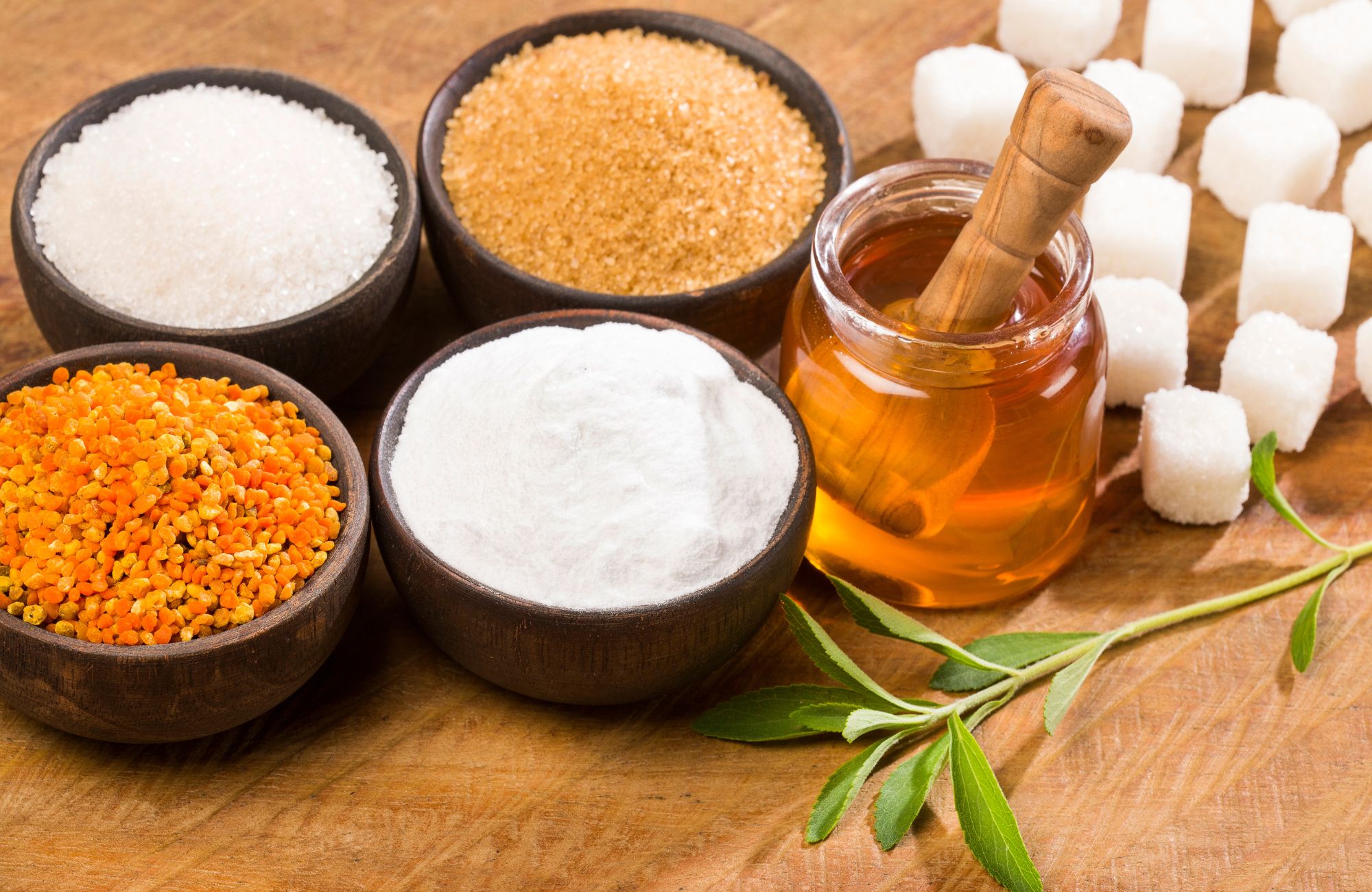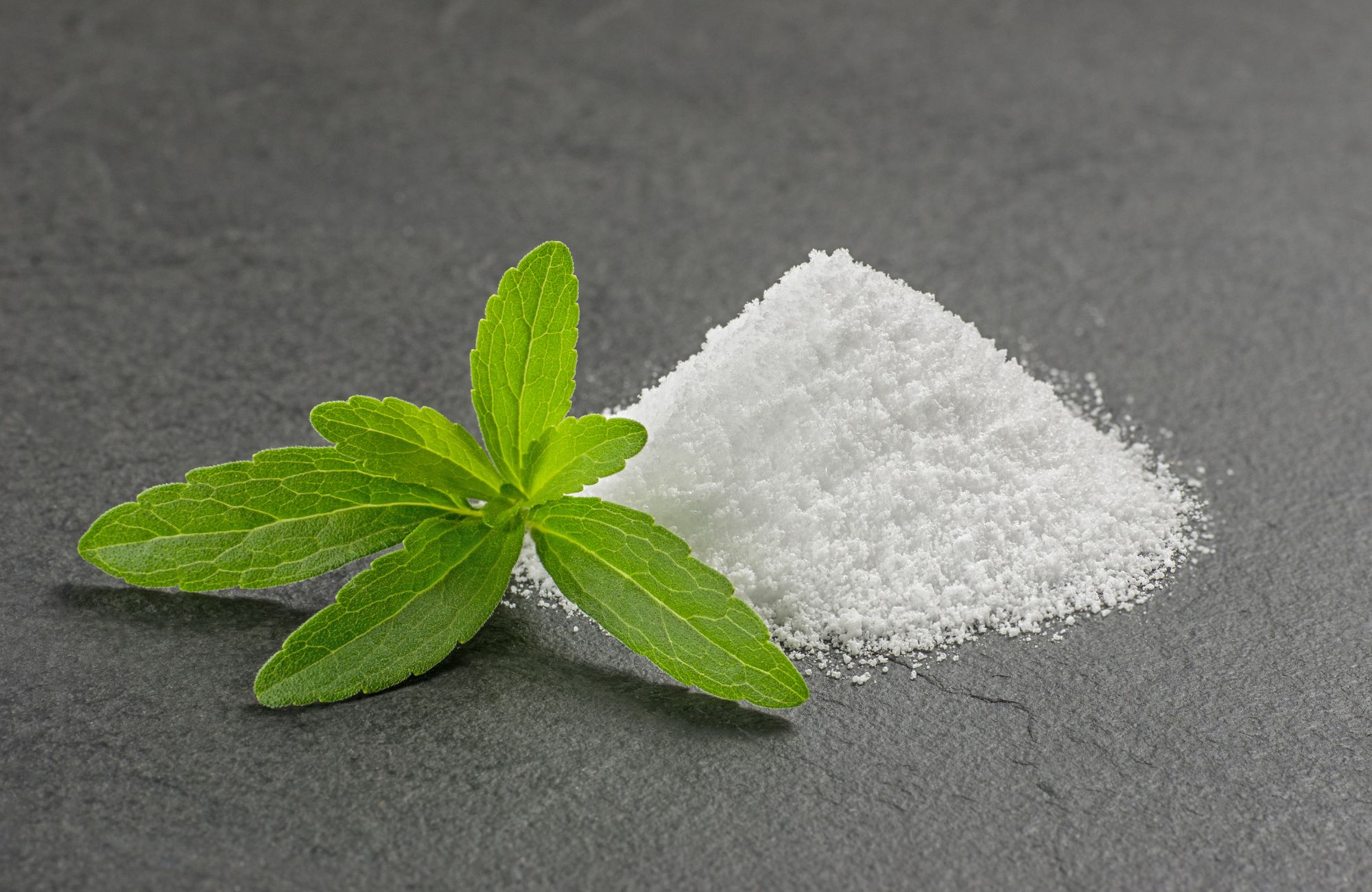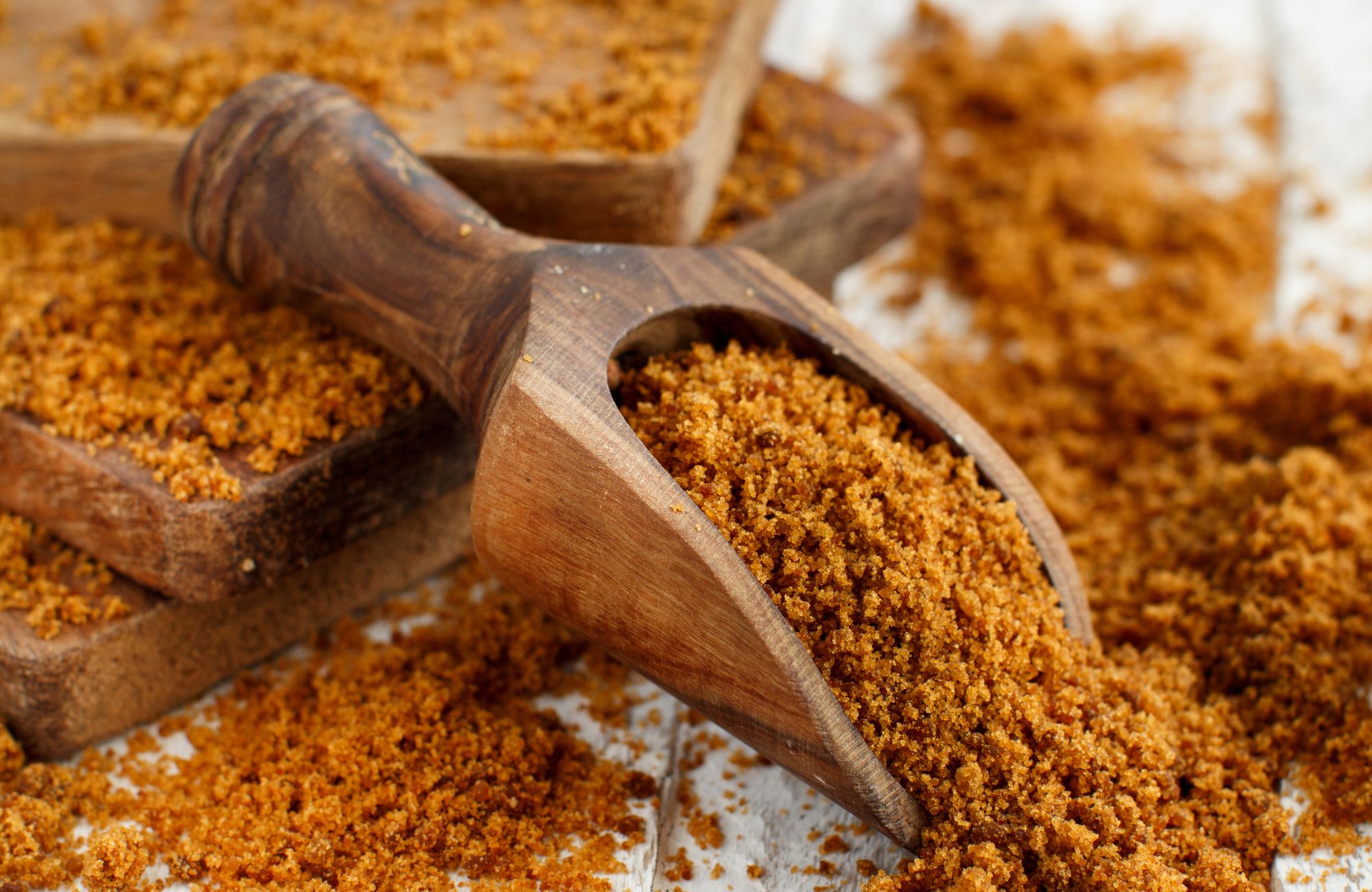
Craving dessert while trying to stick to a low-carb lifestyle is all too common. With the average American consuming 77 pounds of sugar a year, it’s no surprise that more people are seeking low-carb sweeteners to support ketogenic, diabetic-friendly, or reduced-carb diets.
Choosing the right sweetener is key to staying on track. The wrong one can spike your blood sugar or kick you out of ketosis. This guide breaks down natural, sugar alcohol, and artificial sweeteners to help you satisfy your sweet tooth without sacrificing your health goals.
Understanding Sweeteners on a Low-Carb Diet
What Makes a Sweetener “Low Carb” or “Keto-Friendly”?
Not all sugar-free options are created equal. For a sweetener to truly be low carb or keto-friendly, it needs to have minimal impact on blood sugar levels and insulin response while containing few or no digestible carbohydrates.
Net carbs represent the carbohydrates your body actually processes for energy. They’re calculated by taking the total carbs and subtracting fiber and certain sugar alcohols that pass through your system undigested. On a ketogenic diet, keeping net carbs below 20-50g daily is typically necessary to maintain ketosis.
The Science Behind Sweeteners
Traditional sugar breaks down into glucose and fructose, quickly raising blood sugar and triggering an insulin response that can disrupt ketosis and fat burning. The best low-carb sweeteners contain minimal digestible carbs, have a low glycemic index, don’t spike insulin, support ketosis, and offer few calories.
Different sweeteners and sugar work through various mechanisms to provide sweetness without the metabolic impact of sugar:
- Non-nutritive sweeteners (like stevia and monk fruit) contain compounds hundreds of times sweeter than sugar, so tiny amounts provide sweetness without significant calories or carbs.
- Sugar alcohols (like erythritol and xylitol) have a chemical structure that your body cannot fully digest, reducing their caloric value and blood sugar impact.
- Artificial sweeteners (like sucralose and aspartame) are synthetic compounds that provide intense sweetness with virtually no calories, though they may have other metabolic effects.
The Top 6 Low-Carb Sweeteners
1. Stevia: The Plant-Based Powerhouse
Stevia is a natural sweetener derived from the Stevia rebaudiana plant, which has been used for a long time in South America. Its active compounds, steviol glycosides, provide intense sweetness without calories or carbs, making it ideal for low-carb and keto diets. It doesn’t raise blood sugar or insulin levels and may even offer benefits like improved blood pressure. Stevia is great in drinks, yogurt, oatmeal, and no-bake treats and is available in liquid, powder, and granulated forms.
While stevia is much sweeter than sugar (about 200–350 times), it can have a licorice-like aftertaste, especially in larger amounts. High-quality extracts or blending with sweeteners like erythritol can reduce this. As a rough guide, 1 cup of sugar equals about 1 teaspoon of pure stevia powder.
2. Erythritol: The Baker’s Friend
Erythritol is a sugar alcohol found naturally in fruits but commonly produced by fermenting corn. It’s popular for low-carb diets because it has almost no calories, zero net carbs, and doesn’t raise blood sugar or insulin levels. It’s about 70% as sweet as sugar and is better tolerated than other sugar alcohols, with little risk of digestive upset.
Erythritol mimics sugar’s texture, making it great for baking, drinks, and frozen treats. It has a mild cooling effect on the tongue and doesn’t caramelize, so it’s best in recipes that don’t rely on browning. Use about 1⅓ cups of erythritol to replace 1 cup of sugar.
3. Monk Fruit: The Ancient Secret
Monk fruit, also known as luo han guo, is a natural sweetener used for centuries in Traditional Chinese Medicine. Its sweetness comes from mogrosides, which are 150–300 times sweeter than table sugar but contain no calories or carbs. Unlike sugar, monk fruit doesn’t raise blood sugar or insulin levels and is often praised for its clean, sugar-like taste.
Pure monk fruit extract is rare and expensive, so most commercial products blend it with other sweeteners like erythritol, allulose, or stevia. Always read labels, as some “monk fruit” products may contain only trace amounts. It’s great for replacing table sugar in drinks, no-bake desserts, and sauces.
4. Xylitol: The Dental-Friendly Option
Xylitol is a sugar alcohol naturally found in fruits and vegetables, but it’s commonly derived from birch or corn. It looks and tastes very similar to table sugar, has 40% fewer calories, a low glycemic index, and even helps fight tooth decay by reducing harmful bacteria. It’s an easy 1:1 substitute in most recipes, especially for baking.
However, xylitol can cause digestive issues in some people if consumed in large amounts, and it’s extremely toxic to dogs—even small doses can be life-threatening. Always store it safely if you have pets at home.
5. Allulose: The Emerging Star
Allulose is a rare sugar found in small amounts in foods like wheat, figs, and raisins. Although it resembles fructose chemically, the body doesn’t metabolize it for energy, making it nearly calorie-free and having no effect on blood sugar or insulin levels. With about 0.4 calories per gram and zero net carbs, it’s roughly 70% as sweet as table sugar.
What sets allulose apart is its ability to caramelize and brown like sugar, making it ideal for recipes where texture and color matter. It’s especially useful in ice cream (to reduce crystallization), candy-making, and baked goods that benefit from browning.
6. Yacon Syrup: The Fiber-Rich Option
Yacon syrup is a natural sweetener derived from the root of the yacon plant, native to South America. It contains fructooligosaccharides (FOS), a type of prebiotic fiber that the body doesn’t fully digest, giving it about half the calories of sugar and a low glycemic impact. It may also support gut health thanks to its prebiotic content.
However, yacon syrup does contain some digestible sugars and isn’t heat-stable, as FOS breaks down at high temperatures. It’s best used in cold drinks, salad dressings, or as a drizzle over yogurt and pancakes. Some people may experience digestive discomfort, especially in larger amounts.
Sweeteners to Avoid on a Low-Carb Diet
High-Impact Sugar Alcohols
Maltitol: Despite being marketed as “low carb,” maltitol has a relatively high glycemic index (35-52) and can significantly impact blood sugar. It’s commonly found in “sugar-free” candies and chocolates, but is best avoided on a strict low-carb or keto diet.
Natural High-Carb Sweeteners
Just because something is natural doesn’t mean it’s low carb. These natural sweeteners should generally be avoided on a low-carb diet:
- Honey: Despite having beneficial compounds, honey is still primarily sugar (about 82%)
- Maple syrup: Contains some minerals but is mostly sucrose
- Coconut sugar: Only marginally lower GI than regular sugar
- Agave nectar: High in fructose, which can contribute to insulin resistance
- Dates and date sugar: Very high in carbohydrates
Deceptive “Zero-Calorie” Products
Many “zero-calorie” sweetener packets contain hidden carbs. The FDA allows products with less than 5 calories per serving to be labeled as zero calories. Manufacturers use this loophole by making the serving size small enough (like one packet) to fall under this threshold.
Common bulking agents in these packets include dextrose and maltodextrin, which are pure carbs with a high glycemic index. About 95% of a “zero-calorie” packet can be pure sugar!
Practical Use Guide
Best Sweeteners for Specific Uses
For Coffee and Tea:
- Liquid stevia
- Monk fruit drops
- Allulose (dissolves well)
For Baking:
- Erythritol (cookies, cakes)
- Allulose (browning, caramelizing)
- Xylitol (moist baked goods)
- Erythritol-monk fruit blends
For Frozen Desserts:
- Allulose (prevents crystallization)
- Xylitol (good freezing properties)
For No-Heat Applications:
- Any of the top sweeteners
Sweetener Blending: Getting the Best of Both Worlds
Creating your own sweetener blends can give you better results than using a single sweetener:
Basic Baking Blend:
- 1 cup erythritol
- ¼ teaspoon pure stevia powder or monk fruit extract (This approximates the sweetness of 1 cup sugar with reduced cooling effect)
Brown Sugar Substitute:
- 1 cup erythritol
- 1-2 tablespoons blackstrap molasses (Adds minimal carbs but gives authentic flavor)
Health Considerations
Impact on Blood Sugar and Insulin
Although the sweeteners above generally have little effect on blood sugar, individual responses can vary based on factors like metabolic health, insulin sensitivity, portion size, and what you eat with them. If you have diabetes or monitor your blood glucose closely, it’s best to test how your body responds.
Gut Health Considerations
Some sweeteners may influence gut bacteria, though research is still ongoing. Sugar alcohols can feed gut microbes, which may cause gas or bloating, while prebiotic effects from certain sweeteners may support gut health for some but lead to discomfort for others. Tolerance varies widely between individuals.
Cravings and Weight Management
Some studies suggest that intensely sweet foods, even if calorie-free, might:
- Maintain or increase cravings for sweet foods
- Potentially increase appetite through complex neural pathways
- Affect how your body responds to actual sugar
However, many people successfully use low-carb sweeteners as part of an overall healthy diet without experiencing increased cravings or hunger.
Conclusion
Navigating the world of low-carb sweeteners can feel overwhelming, but the right choices can support your health goals without sacrificing flavor. From zero-carb options like stevia and erythritol to innovative alternatives like allulose and monk fruit, each sweetener offers unique benefits for ketogenic, diabetic, and reduced-sugar diets. Understanding their effects on blood sugar, digestion, and cravings empowers you to enjoy sweet treats while staying on track with your wellness journey.
At US Sweeteners, we supply high-quality bulk sweeteners trusted by manufacturers and food professionals nationwide. Whether you’re formulating a keto-friendly product or seeking a reliable low-glycemic alternative, we offer everything from erythritol and allulose to liquid blends and custom formulations. Contact us today to explore our inventory and find the ideal sweetener solution for your business.
FAQs
What sweetener has the least amount of carbs?
Stevia, monk fruit, erythritol, and allulose all contain zero net carbs, making them the lowest-carb sweetener options available for those looking to minimize sugar consumption on low-carb and keto diets.
What sugar is allowed on a low-carb diet?
No traditional sugars are truly “allowed” on a strict low-carb diet, but alternative sweeteners like stevia, monk fruit, erythritol, allulose, and xylitol can be used instead since they provide a sweet taste without the negative metabolic effects of regular sugar.
Is stevia OK for a low-carb diet?
Yes, stevia is excellent for a low-carb diet because it contains zero carbs, zero calories, doesn’t raise blood glucose levels, and is available in various forms (liquid, powder, and granulated) for different uses.
What is the healthiest sugar substitute?
The healthiest sugar substitute depends on individual needs, but stevia and monk fruit are often considered top choices because they’re plant-derived, contain zero calories and carbs, don’t impact blood sugar like high fructose corn syrup does, and have additional potential health benefits beyond just sweetening.



Leave a Reply